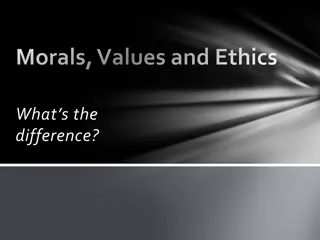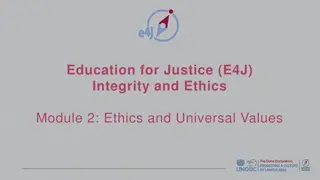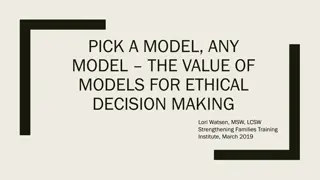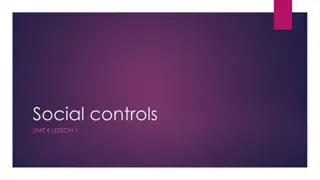Understanding the Difference Between Morals, Values, and Ethics
Morals are about right and wrong, values guide decision-making, and ethics are societal standards of behavior. Moral development involves personal growth in understanding these concepts. The Heinz dilemma illustrates ethical decision-making.
Download Presentation

Please find below an Image/Link to download the presentation.
The content on the website is provided AS IS for your information and personal use only. It may not be sold, licensed, or shared on other websites without obtaining consent from the author. Download presentation by click this link. If you encounter any issues during the download, it is possible that the publisher has removed the file from their server.
E N D
Presentation Transcript
MORALS, VALUES AND ETHICS WHAT S THE DIFFERENCE? Morals Definition: Motivation based on ideas of right and wrong Morals are more about good and bad than other values. We thus judge others more strongly on morals than values. A person can be described as immoral, yet there is no word for them not following values.
MORALS, VALUES AND ETHICS WHAT S THE DIFFERENCE? Values Values are the rules by which we make decisions about right and wrong, should and shouldn't, good and bad. They also tell us which are more or less important, which is useful when we have to trade off meeting one value over another. Dictionary.com defines values as: n : beliefs of a person or social group in which they have an emotional investment (either for or against something); "he has very conservatives values"
MORALS, VALUES AND ETHICS WHAT S THE DIFFERENCE? Ethics Ethics refers to well based standards of right and wrong that prescribe what humans ought to do, usually in terms of rights, obligations, benefits to society, fairness, or specific virtues. Ethics point to standards or codes of behavior expected by the group to which the individual belongs
MORALS, VALUES AND ETHICS WHAT S THE DIFFERENCE? So, one way to think about is this_ Your morals give you a sense of what is right and wrong You use this sense of right and wrong to develop (or understand) your values Your morals and values influence how you act/respond to given situations based on the standards or codes of behavior expected by the group to which the you belongs
WHAT IS MORAL DEVELOPMENT Moral development involves thoughts, feelings, and behaviors regarding standards of right and wrong Moral development consists of intrapersonal and interpersonal dimensions
Scenario 1 In Europe, a woman was near death from a special kind of cancer. There was one drug that the doctors thought might save her. It was a from of a radium that a druggist in the same town had recently discovered. The drug was expensive to make, but the druggist was charging ten times what the drug cost him to make. He paid $200 for the radium and charged $2,000 for a small dose of the drug. The sick woman s husband, Heinz, went to everyone he knew to borrow the money, but he could only get together about $1,000 which is half of what it cost. He told the druggist that his wife was dying and asked him to sell it cheaper or let him pay later. But the druggist said: No, I discovered the drug and I m going to make money from it. Heinz got desperate and broke into the man s store to steal the drug for his wife. Should the husband have done that? Why or why not?
Scenario 2 Heinz broke into the laboratory and stole the drug. The next day, the newspaper reported the break-in and theft. Brown, a police officer and a friend of Heinz remembered seeing Heinz last evening, behaving suspiciously near the laboratory. Later that night, he saw Heinz running away from the laboratory. Should Brown report what he saw? Why or why not?
Scenario 3 Officer Brown reported what he saw. Heinz was arrested and brought to court. If convicted, he faces up to two years jail. Heinz was found guilty. Should the judge sentence Heinz to prison? Why or why not?
Kohlberg's Moral Ladder Post conventional Conventional Pre-conventional Ideally people should progress through the 3 stages as part of normal development
KOHLBERG'S MORAL LADDER Pre-conventional (approx Birth to 9) Stage 1: Punishment-Obedience Orientation Stage 2: Individualism and Exchange Orientation Conventional ( approx 9 to 20 ) Stage 3: Interpersonal Relationships Orientation Stage 4: Law and Order Orientation Post-conventional (20+ maybe never ) Stage 5: Social Contract Orientation Stage 6: Universal Ethical Principle Orientation
LEVELS OF MORAL DEVELOPMENT Level 1: Pre-conventional Morality Stage 1: Punishment-Obedience Orientation Stage 2: Individualism and ExchangeOrientation
Summary of Stage 1: Punishment-Obedience Orientation Individual obeys rules in order to avoid punishment. The concern is for self Will I get into trouble for doing (or not doing) it? . Good behavior is associated with avoiding punishment. Possible Stage 1 responses to Heinz Dilemma: Heinz should not steal the drug because he might be caught and sent to jail. Heinz should steal the drug because if he doesn t then his wife might be angry at him for not helping her.
Summary of Stage 2: Individualism and Exchange Orientation Individual conforms to society s rules in order to receive rewards. The concern What s in it for me? . Still egocentric in outlook but with a growing ability to see things from another person s perspective. Action is judged right if it helps in satisfying one s needs or involves a fair exchange. Possible Stage 2 responses to Heinz Dilemma: YES: It is right for Heinz to steal the drug because it can cure his wife and then she can cook for him. NO: The doctor scientist had spent lots of money and many years of his life to develop the cure so it s not fair to him if Heinz stole the drug.
LEVELS OF MORAL DEVELOPMENT Level 2: Conventional Morality Stage 3: Interpersonal Relationships (good girl/good boy) Stage 4: Law and Order Orientation
Summary of Stage 3: Interpersonal Relationships Orientation (good girl / good boy) Individual behaves morally in order to gain approval from other people. The concern is What will people think of me? and the desire is for group approval. Right action is one that would please or impress others. This often involves self-sacrifice but it provides the psychological pleasure of approval of others.
Summary of Stage 3: Interpersonal Relationships Orientation (good girl / good boy) Possible Stage 3 responses to Heinz Dilemma: YES: Heinz should steal the drug. He probably will go to jail for a short time for stealing but his in-laws will think he is good husband. YES: Brown, the police officer should report that he saw Heinz behaving suspiciously and running away from the laboratory because his boss would be pleased. NO: Officer Brown should not report what he saw because his friend Heinz would be pleased. NO: The judge should not sentence Heinz to jail for stealing the drug because he meant well he stole it to cure his wife.
Summary of Stage 4: Law and Order Orientation Conformity to authority to avoid censure and guilt. The concern now goes beyond one s immediate group(s) to the larger society to the maintenance of law and order. One s obligation to the law overrides one s obligations of loyalty to one s family, friends and groups. To put it simply, no one or group is above the law.
Summary of Stage 4: Law and Order Orientation Possible Stage 4 responses to Heinz Dilemma: YES: As her husband, Heinz has a duty to save his wife s life so he should steal the drug. But it s wrong to steal, so Heinz should be prepared to accept the penalty for breaking the law. YES: The judge should sentence Heinz to jail. Stealing is against the law. He should not make exceptions even though Heinz wife is dying. If the judge does not sentence Heinz to jail then others may think it s right to steal and there will be chaos in the society.
LEVELS OF MORAL DEVELOPMENT Level 3: Post-Conventional Morality Stage 5: Social Contract and Individual Rights Orientation Stage 6: Universal Ethical Principal Orientation
Summary of Stage 5: Social Contract and Individual Rights Orientation Individual is concerned with individual rights and democratically decided laws. The concern is social utility or public interest. While rules are needed to maintain social order, they should not be blindly obeyed but should be set up (even changed) by social contract for the greater good of society. Right action is one that protects the rights of the individual according to rules agreed upon by the whole society.
Summary of Stage 5: Social Contract and Individual Rights Orientation Possible Stage 5 responses to Heinz Dilemma: YES: Heinz should steal the drug because everyone has the right to life regardless of the law against stealing. Should Heinz be caught and prosecuted for stealing then the law (against stealing) needs to be reinterpreted because a person s life is at stake. NO: The doctor scientist s decision is despicable (bad or unpleasant) but his right to fair compensation (for his discovery) must be maintained. Therefore, Heinz should not steal the drug.
Summary of Stage 6: Universal Ethical Principle Orientation Individual is entirely guided by his or her own conscience. The concern is for moral principles an action is judged right if it is consistent with self-chosen ethical principles. These principles are not concrete moral rules but are universal principles of justice, reciprocity, equality, and human dignity. Possible Stage 6 response to Heinz Dilemma: Heinz should steal the drug to save his wife because preserving human life is a higher moral obligation than preserving property.
TO SUMMARIZE 1. In the preconventional level, (stages one and two) one operates first out of fear of punishment, then in terms of satisfying one's own needs. This stage largely applies to children. 2. In the conventional level (stages three and four) one no longer looks to one's own needs or fears, but adopts the rules and conventions of the majority -- moral acts are those that preserve social norms, "doing one's duty", etc. The primary moral goal is to please others, whether they be friends or a larger social group. 3. In the post-conventional level (stages five and six) the standards one now abides by are no longer those of the community, but ones that the agent believes apply to all persons -- universal principles.
BUT WAIT Kohlberg's scale was tremendously influential, and is still considered the most important ethical model by many. But researcher Carol Gilligan began to notice that on Kohlberg's scale, women rarely progressed beyond the second (conventional) level. Moreover, as Gilligan began to look at other developmental models (those of Freud, Piaget, and Erickson), she noticed that women always came out deficient or deviant.
WHY? Kohlberg only studied males Gilligan studied females Found out some surprising things: a) women conceptualize ethics differently from men b) that their different voice is an equally legitimate way to view ethics
DIFFERENCES BETWEEN MEN AND WOMEN Gilligan s study showed: Women tended much more often than the men of Kohlberg s studies to see the moral life in terms of care rather than justice, in terms of responsibility rather than rights. Whereas men see things as moral issues when they involve competing claims about rights, women see problems as moral when they involve the suffering of other people.
DIFFERENCES BETWEEN MEN AND WOMEN Men see the primary moral imperative as centering around treating everyone fairly, Women see that moral imperative as centering around caring about others and about themselves. Men typically make moral decisions by applying rules fairly and impartially, Women are more likely to seek resolutions that preserve emotional connectedness for everyone.
DIFFERENCES BETWEEN MEN AND WOMEN Similarly, men tend to look back and to judge whether a moral decision was correct or not by asking whether the rules were properly applied, whereas women tend to ask whether relationships were preserved and whether people were hurt.
FUNDAMENTAL DIFFERENCE The quality of the relationships, rather than the impartiality of the decisions, is the standard for evaluating decisions for women
RESPONSIBILITY The meaning of responsibility also changes. For men, being responsible is primarily a matter of being answerable for actions, for having followed (or failed to follow) the relevant rules. For women, the focus of responsibility is in taking care of the other person, including (and sometimes especially emphasizing) their feelings. Moreover, it is directed toward what the other person actually feels and suffers, not what someone/anyone" (i.e., an abstract moral agent) would experience. Responsibility is directed toward real individuals, not to abstract codes of conduct.
THE SENSE OF SELF Men are much more likely to see the self in terms of autonomy, freedom, independence, separateness, and hierarchy. Rules guide the interactions among people, and roles establish each individual s place in the hierarchy. In contrast, women tend to see the self in terms of relatedness, interdependence, emotional connectedness, and responsiveness to the needs of others. Instead of depending on rules as men do, women are much more likely to show an immediate response to the plight of the other person.
THE SENSE OF SELF Women experience themselves, first and foremost, as connected; The self IS its network of relationships.
ETHICAL DILEMMAS BOB IS SITTING AT A TABLE THAT IS NOT HIS OWN, DRAWING ON A PIECE OF PAPER. AFTER A WHILE HE STARTS EXPANDING HIS DRAWING ALL OVER THE TABLE. Your thoughts on this are: 1. He is drawing over someone else s property, which is not polite. 2. Paper is for drawing, tables are not. He should draw on the paper or not at all. 3. What difference does it make? Let him express himself! (does your perspective change if you have to later clean or use the table?)
ETHICAL DILEMMAS DAVID HAS BEEN WATCHING FELLOW STUDENTS PLAY WITH BUILDING BLOCKS. HE WAITS UNTIL HE SEES SOMEONE FINISH THEN HE KNOCKS DOWN THEIR BUILDING, VIOLENTLY KICKING THE BLOCKS EVERYWHERE. YOUR THOUGHTS ON THIS ARE: 1. He shouldn t be knocking down other people s buildings like that. Someone could get hurt. 2. He shouldn t knock down other people s buildings. He didn t build them they did. 3. Let him knock down the blocks, after all, they are going to get knocked down anyway.
ETHICAL DILEMMAS ANNA IS SITTING BY MARY, THE SMARTEST GIRL IN THE CLASS. ANNA FORGOT TO STUDY FOR THE QUIZ THAT DAY AND MARY S ANSWERS ARE VISIBLE. ANNA DECIDES TO CHEAT BY COPYING MARY S ANSWERS. YOUR THOUGHTS ON THIS ARE: 1. Anna should copy the answers: she hasn t had a good grade in a long time. 2. Anna should tell the teacher and ask if she could take the test over again 3. Anna should tell the teacher and receive the F she deserves.
ETHICAL DILEMMAS A madman who has threatened to explode several bombs in crowded areas has been apprehended. Unfortunately, he has already planted the bombs and they are scheduled to go off in a short time. It is possible that hundreds of people may die. The authorities cannot make him divulge the location of the bombs by conventional methods. He refuses to say anything and requests a lawyer to protect his fifth amendment right against self-incrimination. In exasperation, some high level official suggests torture. This would be illegal, of course, but the official thinks that it is nevertheless the right thing to do in this desperate situation. Do you agree? If you do, would it also be morally justifiable to torture the mad bomber's innocent wife if that is the only way to make him talk? Why?
ETHICAL DILEMMAS Your thirteen year old sister was violently raped by a family friend in a drunken episode. The man has gone to jail, but it has torn the family apart and she has subsequently become pregnant. You have never believed that abortion is a good choice and, as you live in Texas, the state has agreed and there are few abortion clinics that could help her. She is, however, alone, scared and with little support from the family. There is a clinic in the next state over and she has asked that you drive her there. Should you take your sister despite your personal beliefs? Why is your decision right or wrong?
ETHICAL DILEMMAS One morning you are driving to work, and as per usual you are running a bit late, so you are driving a touch faster than the speed limit. You reach down to your stereo to change the CD, when all of a sudden your car hits something solid. You spin to a stop, but not before several more cars have run into you and each other in an attempt to avoid the accident. As you look up and out of your car, you can see that you hit a person, and that the person is not looking very good. In fact, you are sure that they are dead. You shakily get out of your car, and look around at the damage that has been caused. Several cars have been badly smashed up, but more importantly you have killed someone with your careless driving.
ETHICAL DILEMMAS As you are standing there in shock, a woman comes up to you, tears running down her face, and obviously very shook up. As a natural reaction, you ask her what is wrong. She gives you a funny look, and then she explains that she just ran over someone. You ask her where this person is, and she points towards the person that you ran over! You don't understand why, but for some reason this woman thinks that she caused this accident and killed the person, when in fact you are well aware that you were the cause. Whoever accepts the blame is likely to be placed in jail for a very long time. If you let the woman take the blame, there is a very good chance you will get away with it all. However, there is also the chance that you could be placed in jail for even longer for trying to cover it up.
ARE ALL ETHICAL JUDGMENTS SUBJECTIVE OR CULTURALLY RELATIVE? To say that a judgment is subjective is to say that it may not generally be shared by others. To say that a judgment is culturally relative is to say that it holds in one culture but not for others.
ARE ALL ETHICAL JUDGMENTS SUBJECTIVE OR CULTURALLY RELATIVE? Judgments like Parents should take good care of their children are in fact generally shared, and maintained in all cultures. To be a parent means that there is another person for whom you are responsible. So at least some ethical judgments are objective and universal, not subjective or culturally relative.
ARE ALL ETHICAL JUDGMENTS SUBJECTIVE OR CULTURALLY RELATIVE? Can you think of any ethical judgments which are NOT Subjective or Culturally relative?
ARE THERE ANY TESTS WHICH DETERMINE WHAT IS RIGHT AND WRONG? Ethics is complicated, and there are no absolute rules for justifying moral judgments. But there are some simple tests that often reveal that something immoral is going on:
ARE THERE ANY TESTS WHICH DETERMINE WHAT IS RIGHT AND WRONG? I. The Golden Rule Test. Suppose you are considering doing something that affects other people in a negative way. Ask, How would I like it if others did this to me? If you wouldn t like the act done to you, it is probably immoral to do it to others.
ARE THERE ANY TESTS WHICH DETERMINE WHAT IS RIGHT AND WRONG? II. The Universal Generalization Test. Suppose that you are considering doing an act called A. Ask, What if everybody did A? If the result of everybody doing A would be against your interests, A is probably immoral.
ARE THERE ANY TESTS WHICH DETERMINE WHAT IS RIGHT AND WRONG? III. The Disclosure Test. Often people do things that are immoral because they are confident that no one will find out about them. Ask, What if my act today were reported tomorrow on the front page of the New York Times? If you would be ashamed to have this happen, A is probably immoral.
ARE THERE ANY TESTS WHICH DETERMINE WHAT IS RIGHT AND WRONG? IV. The Promise Keeping Test A great deal of social life revolves around the making of agreements and promises. Sometimes the agreements are public and explicit; sometimes they are unstated and implicit. When you take on a new role, or a new job, there are implicit understandings about the duties that go with the role or job. If you do not fulfill these duties, you are in a sense breaking a promise. Ask, If I do this, will I be breaking some promise that I made? If the answer is yes, the act is probably immoral.
ARE THERE ANY TESTS WHICH DETERMINE WHAT IS RIGHT AND WRONG? V. The Injury Test. The fifth test is the simplest: Ask, If I do this, will some innocent person get hurt? If the answer is yes, the act may well be immoral. Exception to the rule: If people voluntarily assume risks, in most cases they cannot complain if they suffer harm when the risks are realized.

























